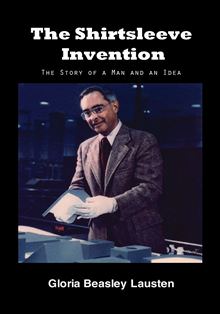I love all things space related. I’m excited by the jaw-dropping images from the Hubble, awed by the Kepler spacecraft’s discoveries, and to be honest, almost moved to tears by the successful landing of the Mars Science Laboratory. As a boy, the Space Shuttle program seemed like science fiction come to life. Behind these peak moments in discovery, there are a lot of people doing a lot of hard work, dedicating their whole lives to solving one problem. One such person is Robert Beasley, the man behind the Thermal Protection tiles used on the Space Shuttle. Robert Beasley was an American chemist who invented and developed the Thermal Protection system for the Space Shuttles which allowed them to re-enter Earth’s atmosphere without burning up.
Universe Today and Bohlsen Group are teaming up to give away 2 free copies of The Shirtsleeve Invention by Gloria Beasley Lausten. Here’s how:
In order to be entered into the giveaway drawing, just put your email address into the box at the bottom of this post (where it says “Enter the Giveaway”) before Friday, September 13, 2013. We’ll send you a confirmation email, so you’ll need to click that to be entered into the drawing.
The Shirtsleeve Invention is the story of Beasley and his idea. The book is a very detailed history of Beasley’s life and career; sometimes a little too detailed. The Shirtsleeve Invention is written by his widow, Gloria Beasley Lausten, who is not a professional writer. At times it is a deeply personal account of her husband. It contains the kind of detail that only a spouse would know, so along with being an account of Beasley’s career, and how his drive and determination helped lead to the development of the Space Shuttle, it also contains lots of detail about his personal life and struggles through childhood, college, and adult life. The book is so personal and full of insight, it’s quite touching at times.
Interviewed after the initial successful flight and re-entry of the Space Shuttle Columbia in 1981, when Beasley’s ceramic tile system did its job and protected Columbia from the 2400 degree heat of re-entry, Bob said to a reporter, “That’s the end of so many years of heartache you can’t imagine. All the heartaches, all the stress, it was worth it.”
The meat of The Shirtsleeve Invention is the account of his idea for the Space Shuttles, and how the idea grew. How he struggled to convince others that his idea was a sound one. It wasn’t always easy, but like things sometimes turn out, his idea proved to be the key for the development of the Space Shuttle and the things that followed. Without the Shuttle Program, there would be no International Space Station and no Hubble Space Telescope. Without Beasley and his creativity and perseverance, who knows where the state of space exploration would be?
This book is a little miscast as a science book. There’s science in there, but for me the book bogged down a little with too much detail about his personal life. There are lots of letters back and forth between him and his relatives and future wife detailing his struggles in school and early working life. The book is realistic; no doubt about that. Without Robert Beasley, and countless others like him, where would the state of human knowledge be? He’s certainly deserving of recognition.
I enjoyed the book, but I found myself skimming over some of the more detailed parts of his private life. Universe Today readers may have a similar experience reading it. But for those of you specifically interested in the lives of people behind the science of space exploration, The Shirtsleeve Invention is for you.
If you don’t want to wait for the win, you can buy a copy on Amazon.com


Quoting you, Katrina, “I love all things space related.”
I did at one point too, but years at NASA convinced me that there are some projects that exist simply because universities turn out lots of grad students, not because the projects they eventually go into are inherently valuable in a relative sense to other science efforts. Also, having worked on a major, well-known astronomy project for years, I know for certain it was a complete waste of money. That the principal investigator knew right from the start the project could not achieve its goals. That’s an extreme case, but with experience now with the astronomical community, I believe less extreme cases are common: That astronomers simply have a feeling of entitlement. And that the public accepts this because they occasionally throw out a few pretty pictures for the public to “consume”, in the sense of consumerism. It’s “Oh, gosh, there’s more detail than ever in this nebula shot!” It’s basically akin to “Oh, gosh, there’s more detail than ever in this iPad, video game, TV screen, etc.” That is … eye candy that’s not at all cost-justified.
I’m not seeing a box that says “Enter the giveaway”.